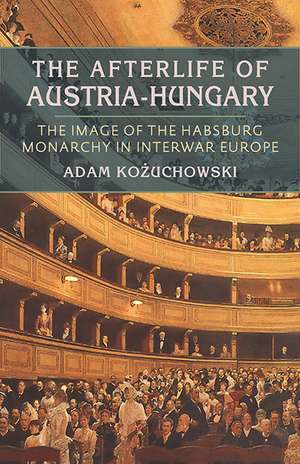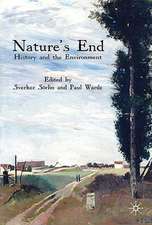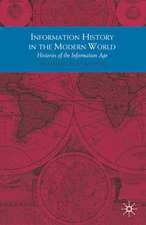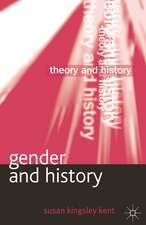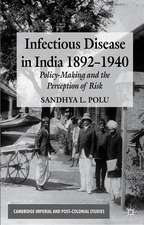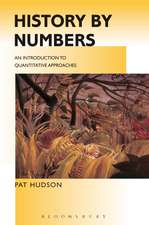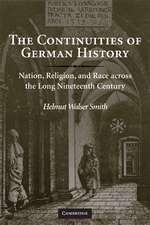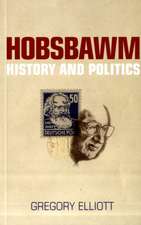The Afterlife of Austria-Hungary: The Image of the Habsburg Monarchy in Interwar Europe: Russian and East European Studies
Autor Adam Kozuchowskien Limba Engleză Paperback – 15 noi 2013
The assassination of Archduke Franz Ferdinand in 1914 was just one link in a chain of events leading to World War I and the downfall of the Austro-Hungarian empire. By 1918, after nearly four hundred years of rule, the Habsburg monarchy was expunged in an instant of history. Remarkably, despite tales of decadence, ethnic indifference, and a failure to modernize, the empire enjoyed a renewed popularity in interwar narratives. Today, it remains a crucial point of reference for Central European identity, evoking nostalgia among the nations that once dismembered it.
The Afterlife of Austria-Hungary examines histories, journalism, and literature in the period between world wars to expose both the positive and the negative treatment of the Habsburg monarchy following its dissolution and the powerful influence of fiction and memory over history. Originally published in Polish, Adam Kozuchowski’s study analyzes the myriad factors that contributed to this phenomenon. Chief among these were economic depression, widespread authoritarianism on the continent, and the painful rise of aggressive nationalism. Many authors of these narratives were well-known intellectuals who yearned for the high culture and peaceable kingdom of their personal memory.
Kozuchowski contrasts these imaginaries with the causal realities of the empire’s failure. He considers the aspirations of Czechs, Poles, Romanians, Hungarians, and Austrians, and their quest for autonomy or domination over their neighbors, coupled with the wave of nationalism spreading across Europe. Kozuchowski then dissects the reign of the legendary Habsburg monarch, Franz Joseph, and the lasting perceptions that he inspired.
To Kozuchowski, the interwar discourse was a reaction to the monumental change wrought by the dissolution of Austria-Hungary and the fear of a history lost. Those displaced at the empire’s end attempted, through collective (and selective) memory, to reconstruct the vision of a once great multinational power. It was an imaginary that would influence future histories of the empire and even became a model for the European Union.
The Afterlife of Austria-Hungary examines histories, journalism, and literature in the period between world wars to expose both the positive and the negative treatment of the Habsburg monarchy following its dissolution and the powerful influence of fiction and memory over history. Originally published in Polish, Adam Kozuchowski’s study analyzes the myriad factors that contributed to this phenomenon. Chief among these were economic depression, widespread authoritarianism on the continent, and the painful rise of aggressive nationalism. Many authors of these narratives were well-known intellectuals who yearned for the high culture and peaceable kingdom of their personal memory.
Kozuchowski contrasts these imaginaries with the causal realities of the empire’s failure. He considers the aspirations of Czechs, Poles, Romanians, Hungarians, and Austrians, and their quest for autonomy or domination over their neighbors, coupled with the wave of nationalism spreading across Europe. Kozuchowski then dissects the reign of the legendary Habsburg monarch, Franz Joseph, and the lasting perceptions that he inspired.
To Kozuchowski, the interwar discourse was a reaction to the monumental change wrought by the dissolution of Austria-Hungary and the fear of a history lost. Those displaced at the empire’s end attempted, through collective (and selective) memory, to reconstruct the vision of a once great multinational power. It was an imaginary that would influence future histories of the empire and even became a model for the European Union.
Din seria Russian and East European Studies
-
 Preț: 468.65 lei
Preț: 468.65 lei -
 Preț: 402.44 lei
Preț: 402.44 lei -
 Preț: 141.48 lei
Preț: 141.48 lei -
 Preț: 272.52 lei
Preț: 272.52 lei - 15%
 Preț: 678.74 lei
Preț: 678.74 lei -
 Preț: 184.58 lei
Preț: 184.58 lei - 15%
 Preț: 493.66 lei
Preț: 493.66 lei -
 Preț: 388.79 lei
Preț: 388.79 lei -
 Preț: 436.25 lei
Preț: 436.25 lei -
 Preț: 295.91 lei
Preț: 295.91 lei -
 Preț: 461.94 lei
Preț: 461.94 lei -
 Preț: 127.24 lei
Preț: 127.24 lei -
 Preț: 123.55 lei
Preț: 123.55 lei -
 Preț: 433.53 lei
Preț: 433.53 lei -
 Preț: 363.26 lei
Preț: 363.26 lei -
 Preț: 182.40 lei
Preț: 182.40 lei -
 Preț: 432.57 lei
Preț: 432.57 lei -
 Preț: 474.45 lei
Preț: 474.45 lei -
 Preț: 426.63 lei
Preț: 426.63 lei -
 Preț: 502.16 lei
Preț: 502.16 lei -
 Preț: 431.62 lei
Preț: 431.62 lei -
 Preț: 113.42 lei
Preț: 113.42 lei -
 Preț: 422.00 lei
Preț: 422.00 lei -
 Preț: 395.54 lei
Preț: 395.54 lei -
 Preț: 179.30 lei
Preț: 179.30 lei -
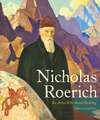 Preț: 326.41 lei
Preț: 326.41 lei -
 Preț: 403.43 lei
Preț: 403.43 lei -
 Preț: 349.81 lei
Preț: 349.81 lei -
 Preț: 428.75 lei
Preț: 428.75 lei -
 Preț: 317.63 lei
Preț: 317.63 lei -
 Preț: 315.41 lei
Preț: 315.41 lei -
 Preț: 175.11 lei
Preț: 175.11 lei -
 Preț: 422.97 lei
Preț: 422.97 lei -
 Preț: 391.67 lei
Preț: 391.67 lei -
 Preț: 485.99 lei
Preț: 485.99 lei -
 Preț: 389.76 lei
Preț: 389.76 lei -
 Preț: 238.43 lei
Preț: 238.43 lei -
 Preț: 352.86 lei
Preț: 352.86 lei -
 Preț: 465.76 lei
Preț: 465.76 lei -
 Preț: 126.00 lei
Preț: 126.00 lei -
 Preț: 283.50 lei
Preț: 283.50 lei -
 Preț: 397.45 lei
Preț: 397.45 lei - 23%
 Preț: 568.69 lei
Preț: 568.69 lei - 23%
 Preț: 565.89 lei
Preț: 565.89 lei - 23%
 Preț: 556.25 lei
Preț: 556.25 lei -
 Preț: 385.91 lei
Preț: 385.91 lei -
 Preț: 422.97 lei
Preț: 422.97 lei -
 Preț: 385.53 lei
Preț: 385.53 lei -
 Preț: 423.35 lei
Preț: 423.35 lei -
 Preț: 386.88 lei
Preț: 386.88 lei
Preț: 383.01 lei
Nou
Puncte Express: 575
Preț estimativ în valută:
73.30€ • 75.88$ • 61.95£
73.30€ • 75.88$ • 61.95£
Carte tipărită la comandă
Livrare economică 06-20 martie
Preluare comenzi: 021 569.72.76
Specificații
ISBN-13: 9780822962656
ISBN-10: 0822962659
Pagini: 232
Ilustrații: 13 b&w illustrations
Dimensiuni: 140 x 216 x 15 mm
Greutate: 0.3 kg
Ediția:1
Editura: University of Pittsburgh Press
Colecția University of Pittsburgh Press
Seria Russian and East European Studies
ISBN-10: 0822962659
Pagini: 232
Ilustrații: 13 b&w illustrations
Dimensiuni: 140 x 216 x 15 mm
Greutate: 0.3 kg
Ediția:1
Editura: University of Pittsburgh Press
Colecția University of Pittsburgh Press
Seria Russian and East European Studies
Recenzii
“The 'Habsburg myth' was born of a unique constellation of events. . . . While many historians have analyzed the role of the Austrian idea in maintaining the dynastic state, Kozuchowski demonstrates its application by those attempting to construct a post-Habsburg Austrian identity. . . . The book is a fine translation from Polish with clear, often whimsical prose . . . a fascinating survey of the men who shaped the postwar image of the Habsburg Monarchy and the reasons for their success."
—American Historical Review
—American Historical Review
“In this slender volume we find a light-hearted but thorough analysis of the various musings, analyses, and conversations that created the images of Austria-Hungary that would define what it had been to those who had never seen it. Essayists, novelists, journalists, and historians are laid alongside one another as contributors to a joint project of memorializing the empire—its successes and failures—not in a vacuum but in the context of the turmoil and tragedy of the twentieth century. An interesting study for anyone interested not only in history but also in how it is made.”
—Alison Frank Johnson, Harvard University
—Alison Frank Johnson, Harvard University
“For those interested in the history of the Habsburg monarchy, Kozuchowski's study of its image in the interwar period will prove a delightful addition to the available literature. It is clearly written, full of insights, and covers the views of historians, novelists, political scientists, and political survivors. It is not an analysis of the fall of the monarchy but an examination of how different streams of memory and criticism fashioned a Habsburg myth. How seriously the monarchy should be taken historically is left deliciously hanging in the balance.”
—Alan Sked, London School of Economics and Political Science
—Alan Sked, London School of Economics and Political Science
“In 1918 the Austro-Hungarian monarchy disappeared. This book describes and analyzes discourses on the Habsburg empire in the following postwar period. While historians were dealing with causes of its decline and fall, political essays focused on the shaping of an Austrian identity, and novelists displayed Austria-Hungary as a fictional country. A superb book that illustrates how images of a past world were constructed and how such discourses influence our interpretation of the past today.”
—Annemarie Steidl, University of Vienna Institute of Economic and Social History
—Annemarie Steidl, University of Vienna Institute of Economic and Social History
Notă biografică
Adam Kozuchowski is assistant professor at the Institute of History, Polish Academy of Sciences, in Warsaw.
Descriere
The Afterlife of Austria-Hungary examines histories, journalism, and literature in the period between world wars to expose both the positive and the negative treatment of the Habsburg monarchy following its dissolution and the powerful influence of fiction and memory over history. Originally published in Polish, Adam Kozuchowski’s study analyzes the myriad factors that contributed to this phenomenon.
